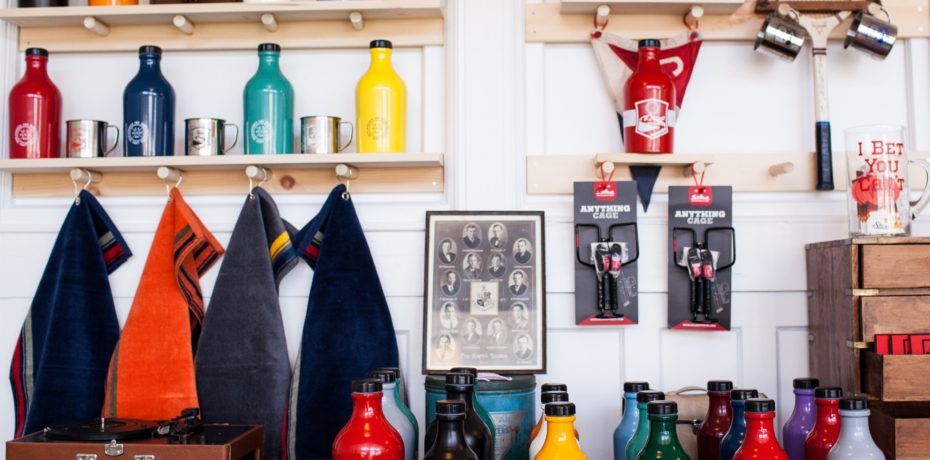By Elizabeth Sobka
During the summer of 2014, Jordan and Kim Childs moved back to Richmond after an extended stay in the world of big brands and international advertising agencies. As Jordan describes it, “I worked for some great companies but found I spent most of my time talking about what we were going to do versus pulling triggers. The larger the company, the more time is needed to make even the smallest decision.”
With Jordan and Kim both graduating from the VCU Brandcenter in 2009, their post-grad journey is the standard tale of success and creature comfort one would expect after doling out the cash and enduring the grueling workload to attend one of the country’s top advertising programs. The Childs stuck to the formula: pay for the program, work hard, enjoy (almost) guaranteed employment at a swanky agency in San Francisco or New York, or somewhere cooler, and generally go on to live the dream.
We’re raised to trust the formula, not question it. Eventually, a few of us fall – or jump – off track and are thrown headfirst into the wild and wonderful world of entrepreneurship. When Jordan and Kim decided to take that big first step, it didn’t take them long to discover what was missing in the new equation: space, creative energy, and a sense of camaraderie.
“I wanted to start with something small that allowed for creative people to work together on projects we cared about and executed in a relatively quick fashion. Even working at creative companies, I always wanted my own studio and was equally interested in having a group of people who shared the same values to share it with.”
Eastern Land Collective, Kim and Jordan’s brainchild, operates at the intersection of shared studio and small agency, of storefront and product development space. The membership is a tightly knit community of creatives, contractors, retail brand owners, and a few who do both. On any given day in the studio, candle wax sets, growlers ship, and design clients sip coffee alongside a photo shoot in progress. At last count, seven small businesses call ELC their HQ.
The space, a retail storefront on Meadow and West Broad, is a far cry from the original Collective. At its founding, the appropriately named Eastern Land sat a half-mile past Rocketts Landing on a hilltop off Route 5. Eight individual desks lined the walls, a spacious bar and lounge area overlooked the Richmond skyline, and Roaring Pines’ signature pegboard adorned with American-made wares dominated much of the interior aesthetic. Parking lot wildlife aside, visitors to that side of town were few and far between.
When ELC members packed up its vintage furniture and newish iMacs in July of 2015, the change could not have been more drastic. The 2,800 square feet, almost double that of the East End location, allowed for greater membership accessibility, more meeting space, bigger desks, and a full-blown retail operation.
The current membership base is incredibly diverse, yet very like-minded. Jordan’s company, Shine Craft Vessel Co., designs and manufactures premium growlers, barware, and utilities for social excursions. Kim owns and operates Rare & Worthy, an online vintage retailer. Alan Long of Square Trade Goods Co. joined the Collective last summer and runs his entire candle-making operation out of a corner in the main workspace. The ELC is home to Kate Magee and South Of Belmar’s photography and design studios, as well as the national competition series, SuperFit Games, run by Jamie Sulc. Resident brand strategists, Ben Cheney, Meredith Peck, and Alex Aloise, Facetime-commute to Sylvain Labs, a New York City-based innovation agency. Founding ELC member, Drew Dayberry of Roaring Pines, recently opened his own storefront and soda shop in Church Hill.
While each of ELC’s businesses operates as separate entities, projects are often run agency-style through the Collective. For the creatives, taking on clients as a team allows for bigger projects, higher levels of collaboration, and an opportunity for feedback. In his five-year plan, Jordan hopes to further develop this model.
“It allows freedom for creative people to focus on what they love and be profitable with limited risk. We have the opportunity to do exactly what we want, work with who we want and make great work that builds the profile of the studio, which leads to more partners who want to work here and with us. We exist more as a membership-based opportunity machine. People who work here have access to clients who cover cost of membership and become profitable. For our clients, it’s top-level creative work at fair rates without the built-in overhead of admin, office space, and big retainers.”

